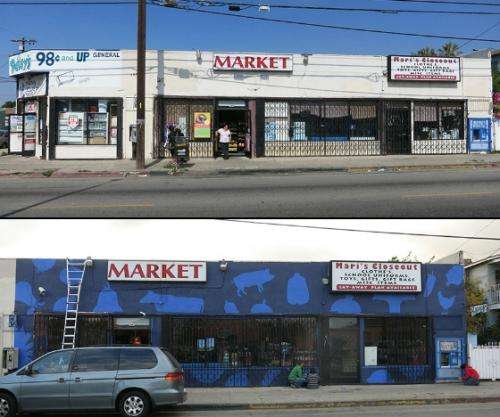UCLA helping to change the way a community eats, one store at a time

Big chain grocery stores, farmers markets and other sources of healthy foods are usually in short supply in low-income communities. Public health experts refer to these areas as "food swamps" for their lack of available nutritious foods.
One such area is in the Boyle Heights neighborhood of East Los Angeles, where fast food reigns and meals are frequently purchased at corner markets. These small stores tend to be rundown, uninviting and focused on selling the bane of healthy eating—junk food.
At noon on Saturday, Dec. 14, the UCLA–USC Center for Population Health and Health Disparities (CPHHD) and the UCLA Fielding School of Public Health will join with local community members in Boyle Heights to celebrate the grand reopening of the neighborhood's Euclid Market, which has been transformed into the opposite of what most corner markets are.
Instead of drab, there is fresh paint. Instead of the prominent placement of junk food and beer, the front of the store now highlights healthy foods like fresh fruits and vegetables, bottled water and nutritious snacks.
The Euclid Market is the third store in the East Los Angeles–Boyle Heights area to undergo a CPHHD-supported transformation. The first opened in November 2011, the second in February 2012.
The latest conversion, funded by the National Heart, Lung and Blood Institute of the National Institutes of Health and led by the UCLA Fielding School of Public Health, is part of a collaborative strategy with community members to change eating habits and reduce disease risk among the area's dominant Latino population, which is plagued by high rates of obesity-related chronic diseases. Obesity stands as one of the nation's most significant public health problems.
"Both of the existing transformed stores in the East L.A. area are reporting increased profits and greater foot traffic, so that's good news for the small business owner," said Alex Ortega, the director of the CPHHD and a professor of public health at the Fielding School.
"But it's even better news for the people in those areas because having access to nutritious food that's convenient to buy will help folks change their bad eating habits," he added. "The goal, of course, is to see improvements in the overall health of our underserved communities."
As part of the collaborative strategy, the Fielding School has joined forces with two area schools—Roosevelt and Esteban Torres high schools—and a consulting firm, Public Matters, that designs and implements media, education and civic engagement initiatives for the benefit of the public. The students receive academic credit for a yearlong course that covers such issues as nutrition and social marketing. They then take to the streets to promote healthy eating among their neighbors, speaking at community events, performing healthy cooking demonstrations and creating promotional videos that highlight the benefits of a healthier lifestyle.
A fourth store, also in Boyle Heights, will be converted in 2014. As part of the project, all four stores will be evaluated over two years using scientific surveys. Final results of the entire evaluation will be available in two to three years.
"The hope is that if this project is successful locally here in L.A., it will serve as a model for the rest of the country," Ortega said. "There is a tremendous need nationally to address the spiraling rates of obesity and related diseases in our low-income neighborhoods."


















